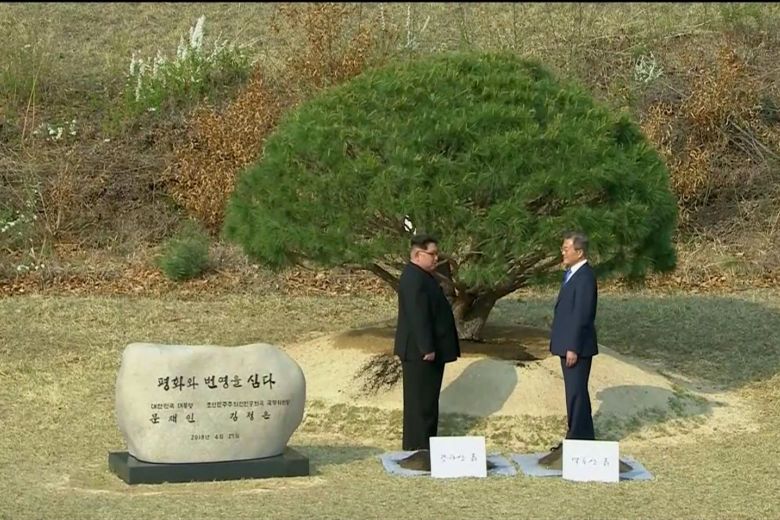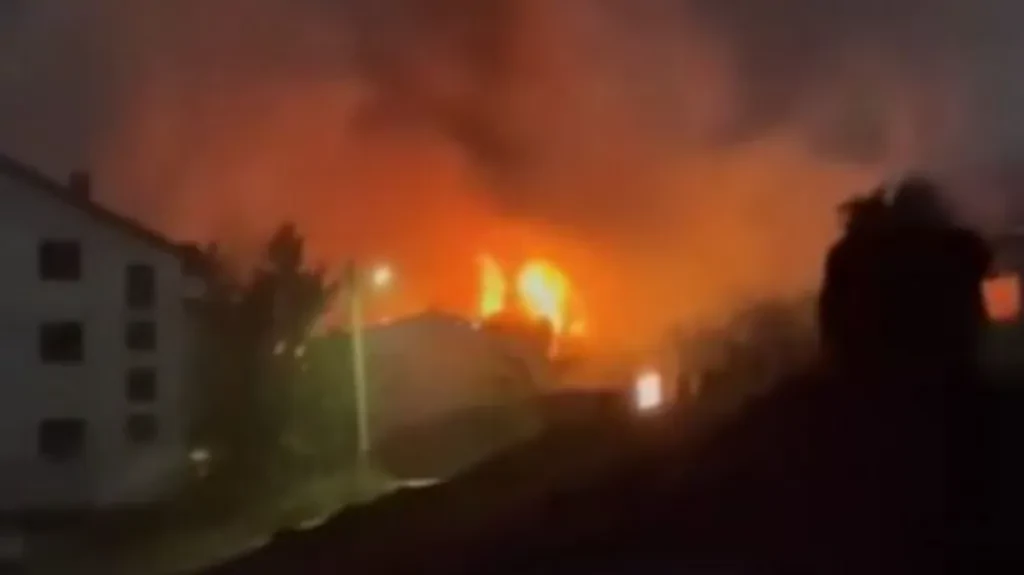Era of Diplomatic Coalitions: Denuclearization of Korea

The iconic meeting of the leaders form North and South Korea this week captured the world’s attention. It was certainly a historic journey in the new phase of diplomacy for ending the long standing Korean crisis. North Korean Leader Kim and his South Korean counterpart Moon shook their hands before crossing into the soil of their countries.
Meanwhile, they earthed up and irrigated the historical pine tree as the part of the symbolic ritual with the hope for getting the peace pollinated in the Peninsula that has been devoid of concrete peace for last more than half a century.
Emanuel Pastreich, the director of Asia Institute verbalizes the entire session of the reception of the Korean Summit that the pageantry of the traditional Korean garbs, the crossing of the DMZ-borders, the handshakes, the hugs, the symbolic family like customs i.e. the typical involvement of the Asian colors in traditions, are very carefully choreographed for reaffirming the relationships.
It was “a few small steps, a giant symbolic gesture” to quote the US media. They were there with the historic but loaded responsibility to formally conclude the war in the Korean Peninsula; jotting down their joint declaration with the superlative diplomatic courtesy followed by the press briefing.
President Trump hails this meeting as the major breakthrough that he made possible through the tireless jobs done by the top diplomats that he recruited with the command of the secretary for State Department, Mike Pompeo.

Mr. Pompeo stresses that moment is a big deal; it is important and every step along the way matters. However, primary objectives of the whole diplomatic drama remain the same— single point agenda of Complete, Verifiable and Irreversible Dismantlement of North Korea nuclear weapons program.
Besides, he tells the time will tell consequences of the assignments done with such degree of excellence and efficacy regarding the hardest issues that had remained untouched and (un)talked. The present US administration acts as if it has its eyes wide open, the team Trump knows the history; it knows the risks. US has ceaselessly been applying the strategic coercion i.e. one of the imminent diplomatic tools in realist measure, against the DPRK.
The strategic coercion, in fact, is way that involves the bargaining behaviors where the opponents’ expectations are affected by the menace to offend them. The threat must be comprehended and submission rewarded—the opponent must be influenced through the use of intimidations. By the threat to use force—the power of coercion, the opponents can be brought down to comply. Hence, there is no role of brute force that should follow as the threat to use force becomes efficacious.
World-wide pressure campaigns have incessantly been holding meetings with the chief stakeholders. Some of the principal concerned parties of the pressure campaigns are the members of the Six-Parties too, that include China, South Korea, Russia, Japan and the US. The six-party talks were a series of multilateral negotiations held since 2003 and attended by China, Japan, North Korea, Russia, South Korea, and the United States for the purpose of dismantling North Korea’s nuclear program ever since her withdrawal from the Nuclear Non-Proliferation Treaty (NPT) in 2003.
Its significance was based on some of the crucial points such as Security guarantee, The construction of light water reactors, Peaceful use of nuclear energy, Diplomatic relations, Financial restrictions / Trade normalization, Verifiable and Irreversible disarmament.
However, neither the six rounds of talks from 2003 till 2011 nor the “leap day” agreement of 2012 could construct the concrete accord among the parties. The senior fellow of Council on Foreign Relations Scott Snyder claims that the Six Party Talks have yielded little or no progress in denuclearizing North Korea.
Given these points, the US has been calling upon its allies globally to build coalitions, as the secretary Pompeo proclaims that the diplomatic coalitions for manufacturing a circumstance to stop DPRK from further escalations of nuclear programs by putting pressure on Chairman Un.
to uphold the recent progress on CVID of DPRK triggered by the present Korean summit, the foreign ministries of the global powers across the world released their press notes with the optimistic feelings that the peace would be prevailed in the Peninsula and the Korean people from both sides of the 38 Parallels would relish peace in everyday life sooner rather later.
For Nepal this meeting is meant for “normalizing their bilateral relations, lasting peace and stability in the peninsula”.
However, the meetings of such kind had also taken place in the past. The former US secretary of state Madeline Albright had built comprehensive diplomatic coalition with the ROK, PRC, Russian Federation and Japan, and visited DPRK with similar degree of courtesy.
Dr. Albright, as a skilled scholar in foreign policy, didn’t leave a single stone unturned to bring the DPRK to the table of peaceful negotiations for resolving the leftovers of the WWII and the wars based on the ideology during the Cold War. Had the US and her regional as well as global allies shown the honesty to guarantee the security and internal stability of DPRK in the aftermath of the negotiations and peace deals, another cycle of diplomatic deadlocks and constant nuclear threats would not be engendered.

Despite, it’s awesome to see the new developments in the Peninsula that is almost unbelievable. Anyone would amaze to find DPRK’s journey from the back to back missile testings to the friendly handshakes and hugs.
Could it be the result of back paddling, foolishness or the results of successful diplomatic exercises President Xi encouraged Chairman Un to perform during his maiden visit to China weeks back? Or is it the very “rational, calculative and cautious survival strategies” keeping no one but Un himself life-long in power?
Kim inherited the country with millions of its people living with dirt poverty, primitive condition and constant pangs of seasonal floods and famines. They need to be rescued immediately before the country wither out and its people die out.
He may have earned some common senses during his school education time in Switzerland—the idea of a decent life of a citizen, the idea of modern democracy, the universal human rights and freedoms of different human affairs.
He should also know that the dynastic rule of any form will inevitably wear out in the advent of democracy. The rebellions in history had taken place in the countries where the despotism, favoritism and authoritarian system are the rules of state.
The socialism which was always dreamed of but has not been delivered is not going to save DPRK from its population who may revolt for the better taste of life. The economic reforms have to be introduced straightaway.
Photos: Agencies



Leave Comment